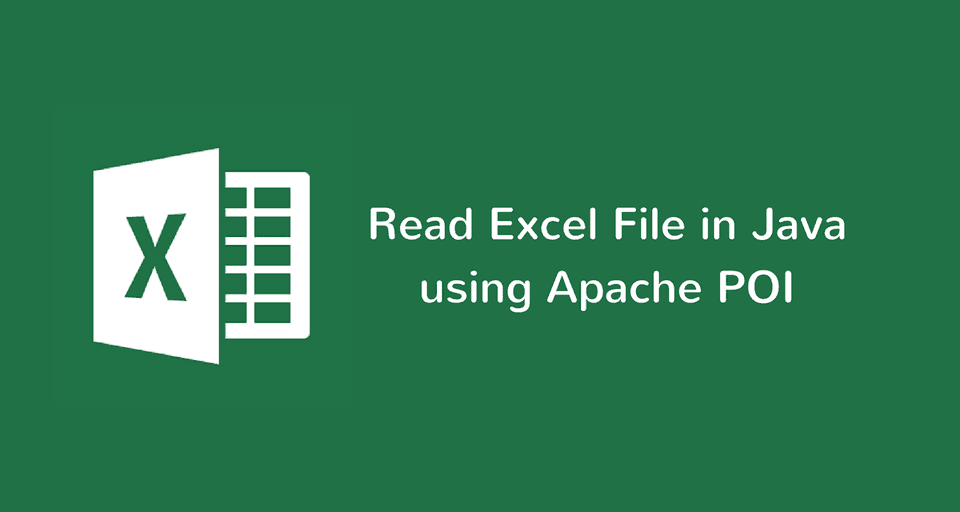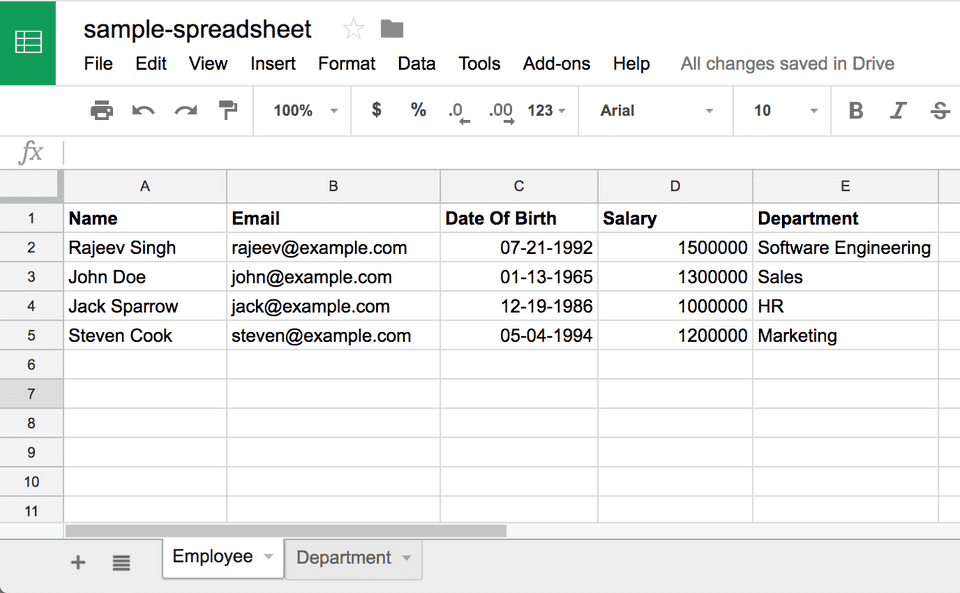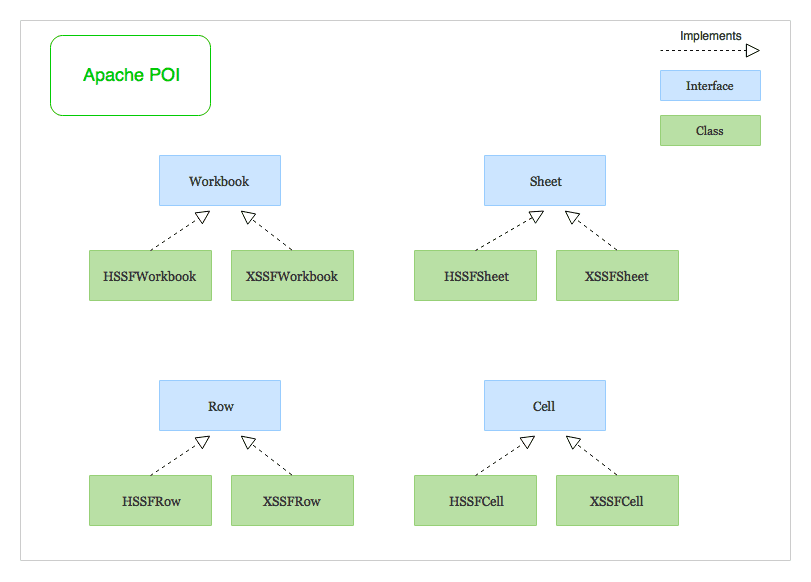Read Excel File Using Apache Poi and Add to

Excel files (spreadsheets) are widely used by people all over the globe for various tasks related to organisation, analysis, and storage of tabular information.
Since excel files are so common, we developers often run into use-cases when we need to read data from an excel file or generate a study in excel format.
In this article, I'll evidence y'all how to read excel files in Coffee using a very unproblematic nevertheless powerful open source library called Apache POI.
And in the adjacent commodity, You'll learn how to create and write to an excel file using Apache POI.
Allow's go started!
Dependencies
First of all, We need to add the required dependencies for including Apache POI in our project. If you use maven, you demand to add the following dependencies to your pom.xml file -
Maven
<!-- https://mvnrepository.com/artifact/org.apache.poi/poi --> <dependency > <groupId > org.apache.poi </groupId > <artifactId > poi </artifactId > <version > iii.17 </version > </dependency > <!-- https://mvnrepository.com/antiquity/org.apache.poi/poi-ooxml --> <dependency > <groupId > org.apache.poi </groupId > <artifactId > poi-ooxml </artifactId > <version > iii.17 </version > </dependency > Gradle
If you lot apply gradle then you lot can add the following to your build.gradle file
compile "org.apache.poi:poi:iii.17" compile "org.apache.poi:poi-ooxml:3.17" The first dependency poi is used to work with the old Microsoft'southward binary file format for excel. These file formats have .xls extension.
The 2d dependency poi-ooxml is used to work with the newer XML based file format. These file formats accept .xlsx extension.
Sample Excel file that Nosotros'll read
Following is a sample excel file that we'll read in our lawmaking. Information technology is created using Google Sheets and has .xlsx extension.
Note that, Although the sample file is of the newer XML based file format (.xlsx). The code that we'll write will work with both types of file formats - .xls and .xlsx

Apache POI terminologies
Apache POI excel library revolves around post-obit four central interfaces -
-
Workbook: A workbook is the high-level representation of a Spreadsheet.
-
Sheet: A workbook may comprise many sheets. The sample excel file that we looked at in the previous section has two sheets -
EmployeeandDepartment -
Row: Every bit the name suggests, It represents a row in the spreadsheet.
-
Cell: A cell represents a column in the spreadsheet.
HSSF and XSSF implementations -
Apache POI library consists of two different implementations for all the above interfaces.
-
HSSF (Horrible SpreadSheet Format): HSSF implementations of POI's high-level interfaces similar
HSSFWorkbook,HSSFSheet,HSSFRowandHSSFCellare used to work with excel files of the older binary file format -.xls -
XSSF (XML SpreadSheet Format): XSSF implementations are used to work with the newer XML based file format -
.xlsx.

Program to Read an excel file using Apache POI
The following program shows you lot how to read an excel file using Apache POI. Since we're not using any file format specific POI classes, the program will work for both types of file formats - .xls and .xlsx.
The program shows three different ways of iterating over sheets, rows, and columns in the excel file -
import org.apache.poi.openxml4j.exceptions. InvalidFormatException ; import org.apache.poi.ss.usermodel. * ; import java.io. File ; import java.io. IOException ; import java.util. Iterator ; public class ExcelReader { public static concluding Cord SAMPLE_XLSX_FILE_PATH = "./sample-xlsx-file.xlsx" ; public static void primary ( Cord [ ] args) throws IOException , InvalidFormatException { // Creating a Workbook from an Excel file (.xls or .xlsx) Workbook workbook = WorkbookFactory . create ( new File (SAMPLE_XLSX_FILE_PATH) ) ; // Retrieving the number of sheets in the Workbook Organization .out. println ( "Workbook has " + workbook. getNumberOfSheets ( ) + " Sheets : " ) ; /* ============================================================= Iterating over all the sheets in the workbook (Multiple ways) ============================================================= */ // 1. Y'all can obtain a sheetIterator and iterate over information technology Iterator < Sheet > sheetIterator = workbook. sheetIterator ( ) ; Organisation .out. println ( "Retrieving Sheets using Iterator" ) ; while (sheetIterator. hasNext ( ) ) { Sheet sheet = sheetIterator. adjacent ( ) ; System .out. println ( "=> " + sheet. getSheetName ( ) ) ; } // 2. Or you can use a for-each loop Organisation .out. println ( "Retrieving Sheets using for-each loop" ) ; for ( Sheet canvass: workbook) { System .out. println ( "=> " + canvass. getSheetName ( ) ) ; } // iii. Or you can use a Java 8 forEach with lambda System .out. println ( "Retrieving Sheets using Java 8 forEach with lambda" ) ; workbook. forEach (canvass -> { Organization .out. println ( "=> " + sheet. getSheetName ( ) ) ; } ) ; /* ================================================================== Iterating over all the rows and columns in a Canvas (Multiple ways) ================================================================== */ // Getting the Sheet at alphabetize zip Sail canvas = workbook. getSheetAt ( 0 ) ; // Create a DataFormatter to format and get each cell's value as Cord DataFormatter dataFormatter = new DataFormatter ( ) ; // 1. You tin can obtain a rowIterator and columnIterator and iterate over them System .out. println ( "\northward\nIterating over Rows and Columns using Iterator\n" ) ; Iterator < Row > rowIterator = sheet. rowIterator ( ) ; while (rowIterator. hasNext ( ) ) { Row row = rowIterator. adjacent ( ) ; // At present let's iterate over the columns of the electric current row Iterator < Prison cell > cellIterator = row. cellIterator ( ) ; while (cellIterator. hasNext ( ) ) { Prison cell cell = cellIterator. next ( ) ; String cellValue = dataFormatter. formatCellValue (prison cell) ; Arrangement .out. impress (cellValue + "\t" ) ; } Organisation .out. println ( ) ; } // 2. Or you can utilize a for-each loop to iterate over the rows and columns System .out. println ( "\n\nIterating over Rows and Columns using for-each loop\n" ) ; for ( Row row: sheet) { for ( Jail cell cell: row) { String cellValue = dataFormatter. formatCellValue (cell) ; System .out. impress (cellValue + "\t" ) ; } System .out. println ( ) ; } // 3. Or you can use Java 8 forEach loop with lambda System .out. println ( "\northward\nIterating over Rows and Columns using Java 8 forEach with lambda\n" ) ; sheet. forEach (row -> { row. forEach (cell -> { String cellValue = dataFormatter. formatCellValue (prison cell) ; Organisation .out. print (cellValue + "\t" ) ; } ) ; Organization .out. println ( ) ; } ) ; // Closing the workbook workbook. close ( ) ; } } Notation that we're not fifty-fifty using the concrete classes like HSSFWorkbook and XSSFWorkbook to create an instance of the Workbook. We're creating the workbook using a WorkbookFactory instead. This makes our program format independent and it works for both types of files - .xls and .xlsx.
The program shows three different means to iterate over sheets, rows, and columns. I adopt the Java viii forEach loop with a lambda expression. Yous may utilize whichever method y'all like.
Annotation that, I've used a DataFormatter to format and get each cell's value as String.
Retrieving Cell values past CellType
Instead of using a DataFormatter to format and get each cell's value every bit String regardless of the Cell type, Y'all may check each cell's blazon and then retrieve its value using various type-specific methods similar this -
private static void printCellValue ( Cell cell) { switch (cell. getCellTypeEnum ( ) ) { example BOOLEAN: Organization .out. print (cell. getBooleanCellValue ( ) ) ; break ; case STRING: Organisation .out. print (cell. getRichStringCellValue ( ) . getString ( ) ) ; intermission ; instance NUMERIC: if ( DateUtil . isCellDateFormatted (prison cell) ) { System .out. print (jail cell. getDateCellValue ( ) ) ; } else { Organization .out. print (cell. getNumericCellValue ( ) ) ; } break ; case FORMULA: System .out. print (prison cell. getCellFormula ( ) ) ; break ; case Blank: System .out. print ( "" ) ; break ; default : System .out. impress ( "" ) ; } System .out. print ( "\t" ) ; } You may now telephone call the above method in the chief program to print each cell'southward value -
sheet. forEach (row -> { row. forEach (jail cell -> { printCellValue (cell) ; } ) ; Organization .out. println ( ) ; } ) ; Decision
That'southward all folks! In this article, You lot learned how to read excel files in Java using Apache POI library. You lot can observe the entire source code on the github repository.
Also, Don't forget to check out the side by side article to learn how to create and write to an excel file using Apache POI
Thank you for reading. Until next time!
Source: https://www.callicoder.com/java-read-excel-file-apache-poi/
0 Response to "Read Excel File Using Apache Poi and Add to"
Enregistrer un commentaire